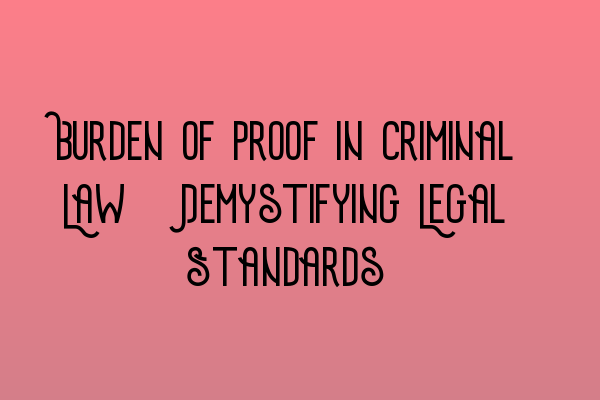Burden of Proof in Criminal Law: Demystifying Legal Standards
As a solicitor in criminal law, understanding the burden of proof is absolutely crucial in successfully defending your clients or prosecuting the accused. The burden of proof refers to the obligation to present evidence and establish certain facts in a legal proceeding. It is the responsibility of the prosecution to prove the guilt of the accused beyond a reasonable doubt.
The Legal Standards
There are different legal standards of proof depending on the nature of the proceedings. Let’s take a closer look at these standards:
1. Beyond a Reasonable Doubt
In criminal cases, the highest standard of proof is “beyond a reasonable doubt.” This means that the prosecution must present evidence that is so convincing, there is no reasonable doubt in the minds of the jurors or judge regarding the guilt of the accused. It is not necessary to prove absolute certainty, but rather that the evidence and testimony lead to an abiding conviction of guilt.
While the prosecution carries the burden of proof, it is important to note that the defense does not need to prove innocence. The accused is presumed innocent until proven guilty, and it is the responsibility of the prosecution to overcome this presumption.
For further understanding of criminal law concepts, you may refer to our related article on SQE 1 Practice Exam Questions.
2. Clear and Convincing Evidence
Another standard of proof commonly used in civil cases, such as family law or civil rights cases, is “clear and convincing evidence.” This standard requires a higher level of proof than a mere preponderance of the evidence but falls short of the beyond a reasonable doubt standard. Clear and convincing evidence means that the evidence presented is highly probable and leaves little to no doubt.
If you are preparing for the SQE exams, you may find our SQE 1 Practice Mocks FLK1 FLK2 helpful for testing your knowledge and understanding of legal standards.
3. Preponderance of the Evidence
The preponderance of the evidence standard is commonly used in civil cases. Unlike the beyond a reasonable doubt standard, this standard simply requires that the evidence presented shows it is more likely than not that the facts of the case are true. This means that the evidence is slightly weighted in favor of one party over the other.
If you are looking to enhance your legal skills for the SQE exams, our SQE 2 Preparation Courses can provide you with the necessary knowledge and training.
Conclusion
Understanding the burden of proof and the different legal standards is essential for any solicitor in criminal law. The burden rests on the prosecution to prove guilt beyond a reasonable doubt, ensuring that justice is served and innocent individuals are not wrongfully convicted.
For more information on SQE exam dates and preparation, please visit our website SRA SQE Exam Dates. We offer comprehensive SQE 1 Preparation Courses to help you excel in the exams and launch a successful career in law.
